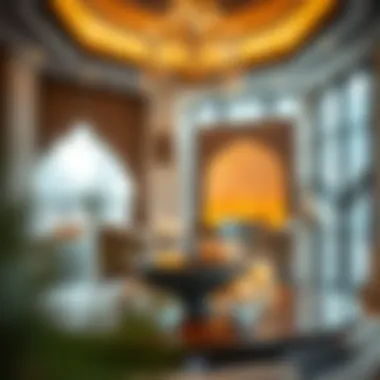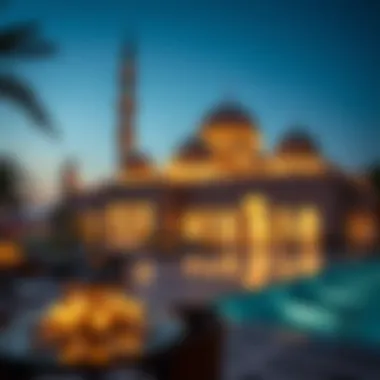Iftar and Sehri Times in Dubai 2023: A Comprehensive Guide


Intro
As the sun sets over the bustling skyline of Dubai during the holy month of Ramadan, the call to prayer resonates, marking the end of a day of fasting. This moment, when families and friends gather to break their fast, is known as iftar. Conversely, before dawn breaks, another meal is shared called sehri. Both hold great significance in the Islamic faith and provide an opportunity to bond, reflect, and enjoy culinary delights.
In 2023, understanding the timings and traditions surrounding these meals can enhance the experience for residents and visitors alike. Whether you are looking to embrace the customs of the local communities or find the best spots to enjoy these meals, this guide covers the essentials.
As we delve deeper into the iftar and sehri times in Dubai, we will take a closer look at the cultural significance of these meals, tips for navigating local dining options during Ramadan, and practical advice for making the most of your fasting month in this vibrant city. From the date-specific details to food etiquette, every aspect of this experience matters, making knowledge key to a meaningful observance.
Prolusion to Ramadan in Dubai
The month of Ramadan is a cornerstone of Islamic culture and holds immense importance for millions around the globe. In Dubai, a city synonymous with luxury and innovation, Ramadan takes on a unique flavor. Understanding how this month is observed in Dubai allows residents and visitors alike to embrace the spirit of community and reflection that accompanies such a significant period. This section sheds light on the cultural nuances and practices that make Ramadan in Dubai a remarkable experience.
Cultural Significance of Ramadan
Ramadan is not just a time for fasting; it embodies a deeper spiritual journey for Muslims. This month encourages self-discipline, personal growth, and a heightened sense of community. As the sun sets each day, the call to prayer is heard from the grand mosques, signaling the end of the fast. During Ramadan, differences dissolve as families and friends gather to break fast together, reinforcing bonds and shared beliefs.
Additionally, Ramadan's observance in Dubai showcases the emirate's vibrant multiculturalism. Many expatriates from diverse backgrounds come together, creating a unique tapestry of traditions and customs. Whether it’s syrian dishes or the Malaysian rendang, you'll find a rich assortment of flavors that intersects with the traditional Arabic cuisine that dominates the local palate.
Moreover, as the community comes together in various ways—like charitable organizations hosting iftars for the less fortunate—it amplifies the message of compassion and giving that Ramadan promotes. Indeed, Ramadan in Dubai is a season for kindling the spirit of solidarity and service, connecting people from myriad cultures.
Overview of Iftar and Sehri
Iftar and sehri are not merely meal times; they represent spiritual milestones in the daily routine of fasting Muslims. Iftar is the evening meal that breaks the fast as the sun sets, while sehri marks the pre-dawn meal consumed before the daily fast begins. The act of breaking the fast is often celebrated with the date, following the tradition of the Prophet Muhammad, and is a time for reflection and gratitude.
In Dubai, Iftar dinners transform into vibrant celebrations, filled with an array of delectable dishes. From traditional lamb biryani to dates stuffed with nuts, the menu extends far beyond simple sustenance. Restaurants and hotels host extravagant iftar buffets, where the ambience captures the warmth of hospitality.
On the other hand, sehri is a quieter affair, often enjoyed with family in a serene setting. It's a critical time to prepare for the fasting day ahead. The meals consumed are not just about nourishment but also about equipping the body for the spiritual journey ahead.
As the month advances, the timings for these meals change, requiring careful attention to local prayer times and schedules. The observance of these times is essential for maintaining the sanctity of the experience during Ramadan. Failing to adhere to the timings can disrupt the entire fasting routine, making it crucial for individuals to be aware of local schedules.
"Embracing the nuances of iftar and sehri in Dubai brings forth a deeper understanding of the Ramadan experience."
As Ramadan progresses, both residents and visitors contribute to the rich tapestry of celebrations. From stunning lantern displays adorning the streets to the hum of joyful gatherings, the essence of Iftar and Sehri becomes a cherished part of one’s monthly rhythm.
Iftar and Sehri Time Calculation Methods
Understanding the calculation of Iftar and Sehri times is fundamental for anyone observing Ramadan in Dubai. These times mark the breaking of the fast and the last pre-dawn meal, respectively. The specific timing can vary each day throughout Ramadan as it is linked closely to the natural rhythm of the sun. This means consideration must be given to not only the solar position but also to cultural practices that might influence when these meals are actually observed.
Importance of Accurate Timing
Having precise timings for Iftar and Sehri is of utmost importance for individuals observing the fast. Eating even a few minutes too early or too late can disrupt not only the fast but also an individual’s spiritual and physical well-being. For many, the ritual of breaking the fast at sunset is imbued with significance, often involving communal prayers and shared meals with family and friends. Consequently, adhering to accurate timings can greatly enhance the experience of Ramadan.
- Spiritual Significance: Observing the fast correctly can foster a deeper connection to spirituality and community.
- Health Considerations: Eating at the right time helps maintain healthy digestion and nourishes the body appropriately, especially after a long day without food.
- Cultural Respect: Being timely shows respect not just to the fast but also towards those who may be observing it alongside you.
In the bustling city of Dubai, some individuals use mobile apps or local mosque announcements to stay informed about the timing. However, it’s crucial to cross-reference these sources for accuracy, as different communities or regions may have slight variations in the proclaimed times.
Astronomical vs. Conventional Methods
When it comes to determining the timing for Iftar and Sehri, two methods are commonly employed: astronomical calculations and conventional guidelines. Each method has its merits, and the choice often depends on personal preference and reliance on technology.
- Astronomical Methods: This approach uses complex calculations based on the sun's position, which correlates to the timing of sunset and dawn. Many Muslims prefer this method because it is precise and relies on established scientific principles. Astronomically accurate timings are generally found in Islamic prayer calendars or through mobile applications that specialize in Ramadan timings.
- Conventional Methods: This approach is often based on traditional local practices and community consensus. For example, some might follow the time set by a particular mosque, which may take into account local geographic features or community customs. While this can create a sense of unity and shared experience, it may lead to slight differences in timings from one neighborhood to another. This variance can sometimes be confusing for those not firmly rooted in their community.
Although both methods strive to provide the best guidance possible, individuals navigating the complexities of timing their meals during Ramadan may find themselves conversing with family and friends to iron out any discrepancies and cultivate a more cohesive communal atmosphere.
Iftar Schedule for Dubai in
The Iftar schedule for Dubai in 2023 plays a crucial role for both residents and visitors during Ramadan. It marks the end of the fasting day, where families and friends gather to break their fast together, fostering community spirit. Knowing the Iftar timings allows individuals to plan their meals and social engagements effectively, ensuring they celebrate this important occasion appropriately. Additionally, understanding the timings can help newcomers navigate their schedules better during this holy month, aligning with local customs, and immersing themselves fully in the Ramadan experience.


Daily Timing Adjustments
As Ramadan progresses, the timing of Iftar undergoes daily adjustments. This is primarily because the fast is broken at sunset, which changes slightly each day due to the Earth’s rotation and the position of the sun. In Dubai, the adjustments can typically range from a minute to several minutes from one day to the next. Therefore, relying on a set timing for the entire month can lead to misunderstandings.
Many mosques in the city announce the Iftar time through loudspeakers, and various apps provide notifications to assist the community. It’s advisable to consult these resources regularly, particularly if you're using them to plan meals or if you're inviting guests over. Staying updated not only helps manage your schedule but also ensures that you can engage with the spiritual elements of Ramadan more fully.
"The precise timing for breaking fast is crucial—it allows one to dedicate time to prayers and reflection, both vital components of Ramadan that go beyond mere sustenance."
Iftar Timing Table
Here's a snapshot of the anticipated Iftar timings throughout Dubai for the month of Ramadan in 2023. (Please consult local resources or platforms to verify exact timings closer to the date.)
| Date | Iftar Time |
| March 23, 2023 | 6:22 PM |
| March 24, 2023 | 6:23 PM |
| March 25, 2023 | 6:24 PM |
| March 26, 2023 | 6:25 PM |
| March 27, 2023 | 6:26 PM |
| March 28, 2023 | 6:26 PM |
| March 29, 2023 | 6:27 PM |
| March 30, 2023 | 6:28 PM |
| March 31, 2023 | 6:29 PM |
| April 1, 2023 | 6:29 PM |
This table illustrates a typical trend where Iftar times gradually advance before stabilizing. Always check local listings, as timings may shift slightly to accommodate celestial variations. In Dubai, locals often break their fast with dates and water, a practice rooted in tradition, followed by a more elaborate meal. Having a clear schedule enhances communal interaction and spiritual observance, pivotal during this month.
For more details on the observance of Iftar during Ramadan, visiting Wikipedia or Britannica can offer deeper insights.
Sehri Schedule for Dubai in
The Sehri schedule is one of the most critical components for those observing Ramadan in Dubai. As the pre-dawn meal, Sehri represents not just sustenance but a moment of reflection and preparation for the day ahead. For residents and visitors, knowing the Sehri times helps ensure that they maximize their fasting experience while respecting cultural and religious practices. In a city as diverse as Dubai, understanding this schedule adds depth to one’s experience during the holy month.
One of the main benefits of adhering to the Sehri schedule is the opportunity it provides to engage with the community. Sunrise signifies the end of the Sehri time, and sharing this moment with family or friends can create bonds that enhance the spiritual experience. It also offers a chance to try popular local dishes that are often reserved for this meal, adding excitement and variety to the fasting routine.
Moreover, understanding the timing aids in managing energy levels throughout the day. A well-planned Sehri can set the tone for the hours ahead, empowering individuals to maintain their strength and focus. Hence, having access to accurate information on the Sehri schedule is not simply a matter of convenience; it is an integral part of observing Ramadan thoughtfully and respectfully.
Daily Timing Adjustments
As Ramadan progresses, the Sehri timing shifts slightly day by day. This fluctuation is largely due to the changing times of dawn, which depend on geographical factors and local atmospheric conditions. In Dubai, residents can expect these adjustments to affect not only their meal planning but also their daily routines.
The timing of Sehri typically encompasses about a 5 to 10-minute buffer before the Fajr prayer, which is when fasting begins. Thus, it is crucial for individuals to stay updated on these daily changes. Some might find it helpful to set reminders on their phones or consult local Islamic websites or mobile applications that provide accurate information according to the region's prayer times.
"In Ramadan, ensuring that you break your fast at the correct times strengthens not only your faith but also your connection to community life."
Sehri Timing Table
For those looking forward to their Sehri meals, here’s a snapshot of when you can expect to have your last chance to eat during Ramadan 2023 in Dubai. Note that the times mentioned below may adjust as Ramadan unfolds, so keeping an eye on reliable local sources is advisable.
| Date | Sehri End Time | Fajr Prayer Time | | March 23 | 5:18 AM | 5:22 AM | | March 24 | 5:17 AM | 5:21 AM | | March 25 | 5:16 AM | 5:20 AM | | March 26 | 5:15 AM | 5:19 AM | | March 27 | 5:13 AM | 5:18 AM | | March 28 | 5:12 AM | 5:17 AM | | March 29 | 5:11 AM | 5:16 AM | | March 30 | 5:09 AM | 5:15 AM | | March 31 | 5:08 AM | 5:14 AM |
Staying informed about these timings is essential for a fulfilling and spiritually rich Ramadan. As you embark on this month's holy observance, remember that planning effectively for Sehri can significantly enhance your experience.
Culinary Traditions During Ramadan
The culinary experience during Ramadan in Dubai encapsulates not just food, but a deep-rooted significance that transcends the mere act of eating. It serves as a time when family and community bonds are rekindled, and cultural heritage is celebrated. As the sun sets, the call to the Maghrib prayer signals the beginning of Iftar, a moment cherished by many.
The allure of the dishes created during this month brings with it not just nourishment but also stories rich with tradition and shared laughter, fed by flavors passed down through generations.
Popular Dishes for Iftar
Iftar is a feast, and that’s no understatement. Across Dubai’s vibrant culinary landscape, tables brim with a diverse assortment of dishes, each telling a tale of its own. Let’s dive into a few of the most beloved Iftar dishes:
- Dates and Water: Traditionally, the fast is broken with dates and water, symbolizing health and energy restoration. The nutritional benefits of dates are praised, providing quick energy to those who have fasted all day.
- Lentil Soup: A warm bowl of lentil soup often opens the meal, soothing the stomach and preparing it for the feast ahead. It’s rich in nutrients and serves as a simple yet comforting option.
- Samboosa: These savory pastries are stuffed with a variety of fillings, from meat to vegetables, and are crispy delights often enjoyed during Iftar. They are not just appetizers; they bring together friends and family around a table, all sharing in the pleasure of good food.
- Grilled Kebabs: The aroma of marinated meats sizzling on the grill is one that signals celebration. Kebabs, whether chicken or lamb, are marinated with spices unique to Middle Eastern cooking, often served with flatbreads and dips like hummus or tzatziki.
- Umm Ali: To round off the meal, this traditional dessert brings warmth and sweetness. A creamy bread pudding that’s rich with nuts and milk, it tends to charm anyone who takes a bite.
As you sit down for Iftar, it’s important to note how sharing these dishes enhances the communal essence of Ramadan.
Traditional Sehri Foods


Sehri, or Suhoor, is the pre-dawn meal that fuels individuals to embrace the day of fasting ahead. This meal is anchored in the belief that a proper Sehri sets the tone for the day. Here are some staple foods that are commonly enjoyed:
- Ful Medames: This hearty dish of fava beans is usually spiced with garlic and lemon, and is a great choice to provide sustained energy. Served with a drizzle of olive oil and some bread, it’s a popular morning option.
- Oats and Fruits: Many choose nutritious oatmeal topped with seasonal fruits. It’s an easy, digestible choice that offers fiber and vitamins, preparing the body for the hours of fasting to come.
- Eggs: In various styles—boiled, scrambled, or even as an omelet—eggs are packed with protein and can stave off hunger for a longer period.
- Flatbreads: Accompanying many Sehri meals, flatbreads are versatile and can be used to scoop up dips or simply enjoyed with tea.
- Yogurt and Honey: Starting the day with yogurt drizzled with honey adds a sweet touch while delivering probiotics that are good for digestion.
Each bite of Sehri food is a reminder of the resilience needed for the day's fast but also an appreciation for the cultural ties that bind communities together.
Remember, the essence of Ramadan is not just in fasting but in the togetherness it fosters through shared meals and experiences.
The culinary traditions during Ramadan in Dubai go beyond just sustenance. It's a journey, a mosaic of flavors and experiences that fosters a sense of belonging and togetherness. Through these meals, one can grasp the spirit of Ramadan, encouraging a sense of unity within the diverse communities that call Dubai home.
Dining Etiquette in Dubai During Ramadan
Understanding dining etiquette during Ramadan in Dubai is of utmost importance, especially for those who are visiting or new to the city. It’s not just about manners but also about respecting the traditions and cultural values embraced by the local Muslim population. By grasping the norms surrounding meal times and the essence of fasting, individuals can navigate social interactions with grace.
Dining etiquette infused with respect can significantly enhance one’s experience of Ramadan. It's a time when communities come together to share meals, stories, and appreciation. Observing correct etiquette shows gratitude towards the local culture and promotes deeper connections with residents. For those considering investing, buying property, or moving, understanding these social dynamics is crucial, as a respectful attitude toward cultural practices often fosters good relations.
General Rules to Consider
When dining during Ramadan, it’s key to approach the situation with an informed perspective. Here are several general rules that should be on your radar:
- Be Mindful of Timing: Avoid eating or drinking in public during daylight hours. This practice is especially important for non-Muslims as it showcases a level of respect towards those who are fasting.
- Dress Modestly: Especially during the holy month, dressing appropriately is paramount. It’s advisable to wear clothes that cover shoulders and knees when out in public.
- Use Restrictions as a Guide: Some restaurants might close during the day and open only after sunset. Knowing the timings can save you from disappointment.
- Wait for the Call to Prayer: Iftar, the meal to break the fast, begins at sunset, marked by the call to prayer. Wait for this signal before partaking in meals, even if you’ve already prepared a feast.
These guidelines not only contribute to a better understanding of local customs but significantly improve your integration within the community. It’s about creating a space of shared respect.
Respecting Fasting Observers
Respecting those who observe fasting is a fundamental aspect of dining etiquette during Ramadan. Fasting is seen as a time for self-reflection, spiritual growth, and communal unity.
- Offer Support: If you find yourself among fasting individuals while dining, it’s considerate to keep your own food and drink discreet. A simple acknowledgment of their fasting can generate a warm rapport.
- Participate in Community Iftars: Joining community iftars not only allows for a shared culinary experience but also fosters a sense of belonging. This is a wonderful opportunity to bond over meals that symbolize unity.
- Understand the Significance of the Meal: The iftar is not merely about food; it symbolizes breaking the day’s fast and connecting with family and friends. Being part of this meal should come from a place of understanding its weight.
"Dining serves as a bridge during Ramadan, connecting various traditions and fostering friendships."
Our shared experiences around food can act as glue, holding various cultures together. For investors or residents, a palpable understanding of these practices can also translate into valuable insights when considering property investments or community engagements.
In summary, abiding by dining etiquette during Ramadan is not only about following rules; it is about engaging meaningfully within a community that holds diverse customs. Respecting those who fast and appreciating the cultural depth surrounding meals can pave the way for lasting relationships in the vibrant city of Dubai.
Iftar Buffets and Events in Dubai
Iftar buffets and community events play an integral role in how residents and visitors in Dubai experience Ramadan. They not only provide a place to break the fast but also facilitate the gathering of friends, family, and neighbors. Dining outside during Iftar has become a delightful ritual, with many restaurants competing to create the most lavish and enticing buffets. The significance of these events extends beyond merely enjoying food. They represent a celebration of community and togetherness during a sacred period.
Local restaurants and hotels often go all out to curate offerings that reflect the rich culinary diversity of Dubai. This is particularly important considering the city's unique mix of cultures, which brings a wealth of flavors to the table. Beyond that, these buffets offer an important chance for community building.
Top Iftar Buffets in the City
This section serves up a smorgasbord of Dubai's top Iftar buffets for 2023. Various hotels lay out elaborate spreads, each unique in its offerings, including both traditional dishes and contemporary culinary fusions.
- Armani/Hashi: Located at the Burj Khalifa, it features an exquisite Iftar buffet combining Middle Eastern and Asian flavors. The ambience matches the luxury of the surroundings, transforming a meal into an experience.
- Ramadan Nights at Jumeirah Beach Hotel: This buffet symbolizes elegance and variety, showcasing dishes that range from Moroccan tagines to Emirati classics. It’s particularly enjoyed for its outdoor seating with stunning views.
- Atlantis The Palm: The significant dining destination remains a favorite for many. Their Iftar buffet offers a mix of international dishes and a lavish dessert selection that never fails to impress.
- The Address Downtown Dubai: This venue is well-known for hosting lavish Iftar gatherings, with a buffet that offers an array of dishes specializing in both traditional and modern interpretations of culinary classics.
The food presented in these buffets offers more than sustenance; each dish tells a story about the diverse cultures that exist within Dubai. However, the best Iftar experiences often depend on finding a buffet that suits personal preferences—whether it’s classic fare or a touch of culinary innovation.
Community Iftar Events
Community Iftar events serve as a bridge connecting different cultures and traditions. These gatherings occur in various neighborhoods and often are organized by local mosques, community centers, and volunteers who want to enrich the spirit of Ramadan. They embody the idea of generosity, inclusiveness, and compassion, inviting everyone to partake, regardless of their beliefs.
- Community Centers: Many local centers host Iftar meals where attendees can contribute food or simply bring their appetites and share a meal with neighbors.
- Mosques: Numerous mosques across the city open their doors for communal meals, offering a sense of unity as people from all walks of life share in the blessings of Ramadan.
- Charity Events: Organizations set up events aimed at serving those in need. Free meals are often provided to less fortunate communities, serving as a reminder of the importance of charity during this month.
"Donating food or volunteering during Ramadan fosters a spirit of community that strengthens the ties among residents in Dubai."


These events hold profound importance both socially and culturally, allowing members of the community to strengthen their bonds while celebrating shared values.
For more detailed insights on Dubai's Ramadan offerings, you may visit Dubai Tourism.
Local Insights: Fasting in Different Communities
In Dubai, Ramadan is not merely a month of fasting; it’s a rich tapestry woven with threads of varying cultural backgrounds. The diverse populace adds vibrancy to the practices observed during this sacred time. Understanding the local insights on fasting is crucial for anyone wishing to truly grasp the essence of Ramadan in the city. It can be slightly different from what one might initially perceive, as customs can be influenced by cultural origins and societal norms.
Diverse Cultural Practices
Fasting in Dubai is a collective affair. While the general principles remain universally aligned with Islamic traditions, individual communities often infuse their personal touch.
- For instance, the South Asian expatriate community might gather in larger family feasts after iftar, sharing dishes that are rich with spices and flavors that harken back to their roots.
- On the other hand, the Arab community may adhere more closely to traditional styles of eating, often showcasing local delicacies like dates and laban as part of their meal.
- Then there's the growing expat community from Europe and the Americas, who may choose to partake in the journey of fasting more selectively, often finding unique eateries that respect the norms while providing international variety.
This flourishing melting pot emphasizes harmony and inclusivity, as people come together regardless of their backgrounds. The significance lies in how these diverse practices not only enhance the iftar table but also promote understanding and respect among varying communities.
Community Support During Ramadan
Community support is a centerpiece during Ramadan, especially in Dubai, where the spirit of giving takes center stage. Many organizations and grassroots initiatives gear up to support those in need during this festive time.
- Food Drives: Local mosques and charities often join forces to organize food drives. They distribute daily iftar meals to less fortunate families. This is a beautiful way to foster community spirit, where everyone pitches in to ensure no one goes hungry.
- Volunteering Opportunities: Numerous residents find joy in volunteering in community kitchens, providing meals, and assisting in preparing food parcels. Each action reinforces bonds within the community, highlighting the values of charity and togetherness.
- Collection of Zakat: Another crucial aspect is the collection of Zakat, which often peaks during Ramadan. It’s common for organizations to set up donation platforms aimed specifically at helping those in need across various communities. This not only aids the less fortunate but ensures that fast-breaking meals are abundant.
Having strong community support during this time amplifies the essence of Ramadan, making it a shared experience. It provides comfort and solidarity, reminding everyone of the importance of compassion and empathy.
"Ramadan is not just about abstaining from food; it’s about connecting with one’s community and extending a helping hand."
By embracing the diversity of fasting practices and encouraging community support, the unique character of Ramadan in Dubai is enriched, turning it into a celebration that resonates with everyone.
Public Services and Amenities During Ramadan
During Ramadan, the dynamics of daily life in Dubai undergo a marked transformation. This period is not just about fasting; it's also coupled with unique public services and amenities that cater to both the fasting population and the vibrant social spirit of the season. Understanding these adjustments is crucial for anyone residing in or visiting the city during this holy month.
One of the most immediate impacts of Ramadan is seen in business hours. Many shops, malls, and government offices adjust their operating schedules to accommodate varying needs. Typically, businesses may open later in the morning and close earlier in the evening, allowing employees to break their fast comfortably and enjoy iftar with their families. These adaptations vary widely, from some retail establishments that may work reduced hours to large shopping complexes that extend their late-night shopping hours.
Adjustments in Business Hours
Understanding the adjustments in business hours during Ramadan is key for both locals and tourists. Here are some noteworthy points:
- Government Offices: They generally open around 9 AM and wrap up around 2 PM. Employees often enjoy a half-day to ensure they can prepare for iftar.
- Shopping Malls: Many malls follow a pattern of opening later, around 10 AM, with closing times extending significantly after iftar, often staying open until midnight or later.
- Restaurants and Cafes: While many dining establishments may remain closed during fasting hours, a greater number will open for iftar. However, you will see fewer choices available until evening.
- Grocery Stores: These often adapt to cater to nighttime shoppers, extending their hours into the warmer weeks of Ramadan.
Overall, as a visitor or resident, adjusting your shopping and errand times according to these hours can lead to a smoother experience.
Transportation Considerations
The transportation system in Dubai also shifts slightly during Ramadan, ensuring that it effectively serves those fasting as well as those in need of late-night travel. Key considerations include:
- Increased Public Transport: There is often an increase in the frequency of public transport services, particularly after iftar. Buses and metro services may run later into the night to accommodate the crowds.
- Traffic Patterns: Roads tend to be busier right before iftar as people rush home. It's wise to plan travel ahead to avoid the last-minute scramble.
- Parking Changes: Some spots that are usually accessible might be reserved for Ramadan events, particularly in prominent areas.
- Preparation for Events: If you’re attending community iftars or events, consider checking local transport schedules in advance to ensure a seamless commute.
"During Ramadan, adaptability is key. Understanding local services can enhance your experience significantly."
Ending
Navigating public services and amenities during Ramadan in Dubai necessitates a good dose of awareness. By keeping tabs on adjustments in business hours and being mindful of transportation considerations, individuals can better engage with the cultural richness of this period. This enables everyone—residents, tourists, and investors alike—to fully appreciate the unique atmosphere that Dubai embodies during Ramadan.
End: Embracing Ramadan in Dubai
As the sun sets and the call to prayer resonates through the bustling streets of Dubai, the spirit of Ramadan becomes palpable. This holy month is much more than a time for fasting; it aims to foster reflection, empathy, and community. The essence of Ramadan here is beautifully interwoven with the vibrancy of the local culture, where diverse traditions coexist. In this section, we will delve into the significance of embracing Ramadan in Dubai, underscoring both the communal and individual aspects that make this month unique.
Reflections on Cultural Experience
Experiencing Ramadan in Dubai offers a chance to immerse oneself in a rich tapestry of cultural practices. From the Iftar gatherings at sunset to the pre-dawn Sehri meals, each moment encapsulates the values of sharing and gratitude. For many, participating in these traditions provides a deep connection to the greater purpose of Ramadan, enhancing one’s appreciation for the community. In this cosmopolitan city, the varied backgrounds of its residents contribute to a unique cultural mosaic, allowing for a kaleidoscope of customs, dishes, and events.
Through twilight gatherings to the sound of laughter echoing in homes, the essence of togetherness prevails. Many Dubai residents find that hosting Iftar is not merely about food, but rather about nurturing relationships, building bonds, and sharing stories. As one reflects on these personal experiences, the lessons learned during this month transcend mere observance; they cultivate a deeper understanding of compassion and altruism.
The Role of Community in Celebrating Ramadan
The community's role during Ramadan cannot be understated. It thrives on mutual support, helping those in need through charity drives and volunteering activities. Local organizations often facilitate iftar meals for the less fortunate, reminding everyone that even a small gesture can make a world of difference. In Dubai, various community events bring together people of all ages and backgrounds to celebrate this month. The Masjid communities often organize open iftars, welcoming attendees regardless of their faith, fostering a spirit of inclusivity.
Moreover, Dubai's vibrant dining scene transforms into a culinary festival, with hotels and restaurants offering elaborate buffets and special menus. This creates a unique opportunity for both locals and tourists to come together in celebration, attempting to create even more memories in the spirit of Ramadan.











